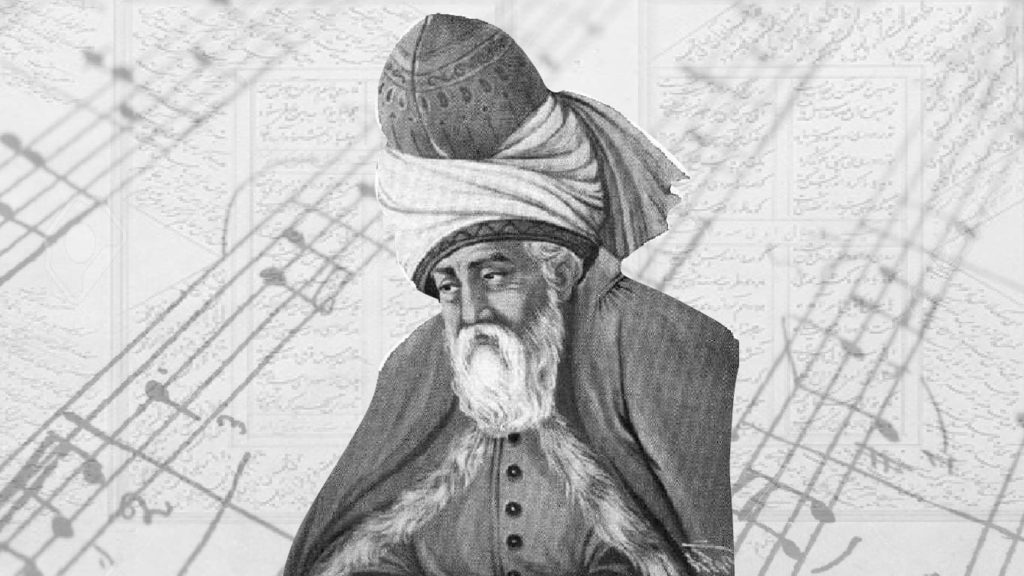
The 13th century Sufi mystic Jalāl ad-Dīn Muḥammad Rūmī described the nature of his spiritual journey with long, expressive poems. This great scholar of the Qu’ran has become one of the most popular poets in the world in recent years, and the intense descriptions of feelings in these works have led to the creation of many emotionally rich pieces of music.
A tongue has one customer, the ear.
A sugarcane flute has such effectbecause it was able to make sugar
in the reedbed. The sound it makesis for everyone. Days full of wanting,
let them go by without worryingthat they do. Stay where you are
inside sure a pure, hollow note.
More: 91Classical continues to celebrate National Poetry Month throughout April.
Born during the crusades, young Rumi lived through constant sociopolitical turbulence, and even the threat of invasion. A meeting with another poet — Shams al Tabriz — defined the rest of his life, as he turned from scholarship to ascetism. This poetry has become a source for both Iran and Afghanistan’s classical musicians, and likewise an entry point for the western world to approach understanding the practice of Sufism. His poems live on as expressions of the possibility of global harmony.
Come, come, whoever you are,
Wanderer, idolater, worshiper of fire,
Come even though you have broken your vows a thousand times,
Come, and come yet again.
Ours is not a caravan of despair
Singer Mohammad Reza Shajarian often takes his lyrics from ancient poets, including Rumi. While his is a familiar voice of sung Muslim prayer in Iran, Shajarian has also turned his attention to protest music, as unrest in Iran has grown in the last two decades. By choosing ancient Iranian poetry, which the country is as a whole very proud of, for his lyrics, Shajarian is able to avoid any censorship from the government, while still singing about an end to oppression. This performance, with no rhythmic meter and heavy ornamentation, much like the songs of the European troubadours, puts the entire emphasis on the words.
More: In 2010 NPR’s Steve Inskeep wrote this profile of Shajarian.
Iranian Kurdish composer Hafez Nazeri composed the Rumi Symphony Project as a celebration of the poet’s 800th birthday in 2007. Deepak Chopra translated the poems, and the piece was a huge success when it premiered in Los Angeles. Nazeri designed his own instrument, which features throughout, as a variation on the traditional setar, with an extended range.
Eric Whitacre wrote This Marriage as a seventh anniversary gift for soprano Hila Plittman. The poem interestingly floats between third person and first person. The speaker blesses “this” marriage, but eventually asks that “our every day” be like paradise. The choral piece still sounds like it is being expressed by one speaker, as Whitacre moves all of the parts together as if one voice is working in harmony.
This choral symphony by Szymanowski is centered around the Rumi poem of the same name – Song of the Night. The poem is mostly sung by the tenor soloist, while the choir joins in vocalise in duet with the violin. The piece could be analyzed as a tone poem rather than a symphony – not just because it is in one movement, but also because of the expressive musical language.
Iranian tenor Shaharam Nazeri’s album Flames of Love features settings of Rumi’s poetry. Nazeri championed Rumi’s poetry from early on in his prodigious career, and was one of few Iranian composers pulling Persian poetry into classical music. This influenced his son, Hafez Nazeri, whose work is above. Together, the two brought a tour of settings of Rumi’s poems worldwide. The performance as Los Angeles’s Kodak Theater is on record as the best attended concert of Persian music ever, outside of Iran.
Composer Augusta Read Thomas seeks big moments with high stakes when she composes a piece of music. For her piece Rumi Settings she was especially inspired by one moment in his poetry:
Stop the words now.
Open the window in the center of your chest
and let the spirits fly in and out.
The intensity of that expression became her benchmark for the emotional character of the piece. She described it has having personal, fiery, honest meaning. Instead of voices, the poetry is expressed by a violinist and cellist. Read Thomas isolates references to music in Rumi’s poems, including a line that could act as a touchstone for all:
We have fallen into the place where everything is music
As 91Classical continues to celebrate Poetry Month, find all of our playlists and articles right here.